How to give a technical interview: 7 technical interview tips
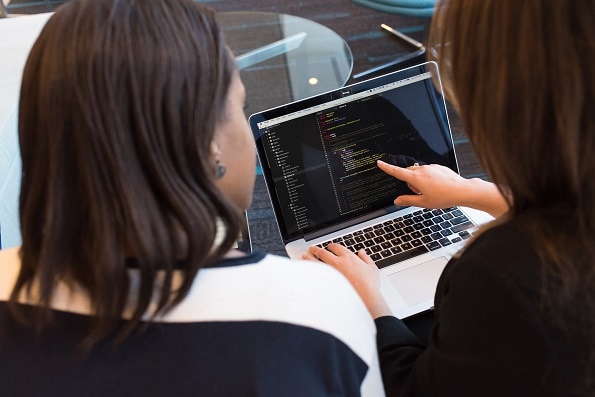
Technical interviews have long been a subject of vocal debate among developers. This has left recruiters searching for technical interview tips that work. In 2016, Sahat Yalkabov, currently working as the Senior Frontend Engineer at Bloomberg LP, wrote a post called “F** You, I Quit, Hiring is Broken.” In this post, he described the technical hiring process as a humiliating and dehumanizing process.The truth is, he has a point.
Technical hiring is facing a huge problem. This can only be solved with the right approach to both technical screening and technical interviews. However, making a positive change requires the HR and IT departments to cooperate. We’ve gathered the best technical interview tips in this article for all parties involved in the process.
For more information on how to conduct a technical interview and what coding challenges to use, check out The ultimate guide to the technical interview while if you want more general interview tips, check out 17 interviewing tips for interviewers.
In this post, we cover the following topics:
- Why do you need technical interview tips?
- What are the best technical interview tips?
Why do you even need technical interview tips?
Technical interviews are typically conducted by technical professionals. In most cases, there’s someone from your developer team, your tech leads, and the CTO depending on the seniority of the position. Candidates are typically asked to answer questions specific to the role they applied for. They might also code together in what is often referred to as pair programming.
The aims of the technical interview are as follows:
- evaluate problem-solving skills
- work together to assess team and company fit
- focus on tasks specific to your company, for instance, the ones your dev team is currently working on
Technical interviews come in all shapes and sizes. They can involve solving tasks together on a technical screening and interview platform, pair programming, whiteboarding, or a combination of more than one of them. Not all of these are equally effective though. As a general rule, the more a given method resembles real work, the better. For that reason, the technical interview should be based on work samples under conditions which mirror the challenges of real-life work. It is easiest to do this by coding together with the candidate, either by means of a screening and interview platform or via pairing tools.
Unfortunately, much of the debate about the technical interview comes from the fact that technical interviews tend to focus on the wrong things. These can include the ability to recall something off the top of your head where you’d normally just Google it. Some companies are also guilty of using buzzwords or asking logical questions which don’t assess coding abilities.
Although interesting, the “two trains and a bird problem” sheds no light on your candidates’ Java skills:
Source: LinkedIn
Need a *really bad* example of what technical interviews shouldn’t look like? Consider yourself warned:
A good technical interview allows developers to showcase their real coding skills. That cannot be achieved with any of the methods mocked in the video. In the words of Quincy Larson, the teacher who founded freeCodeCamp.org, “Virtually every developer I’ve talked with agrees that one’s ability to write algorithms from memory on a whiteboard has almost nothing to do with real day-to-day developer work.”
Why do major players still insist on whiteboard-centric technical interviews to assess their candidates’ fitness for the job? There is nothing wrong with using a whiteboard, it’s just demonized because it stands for everything that’s wrong with the industry. 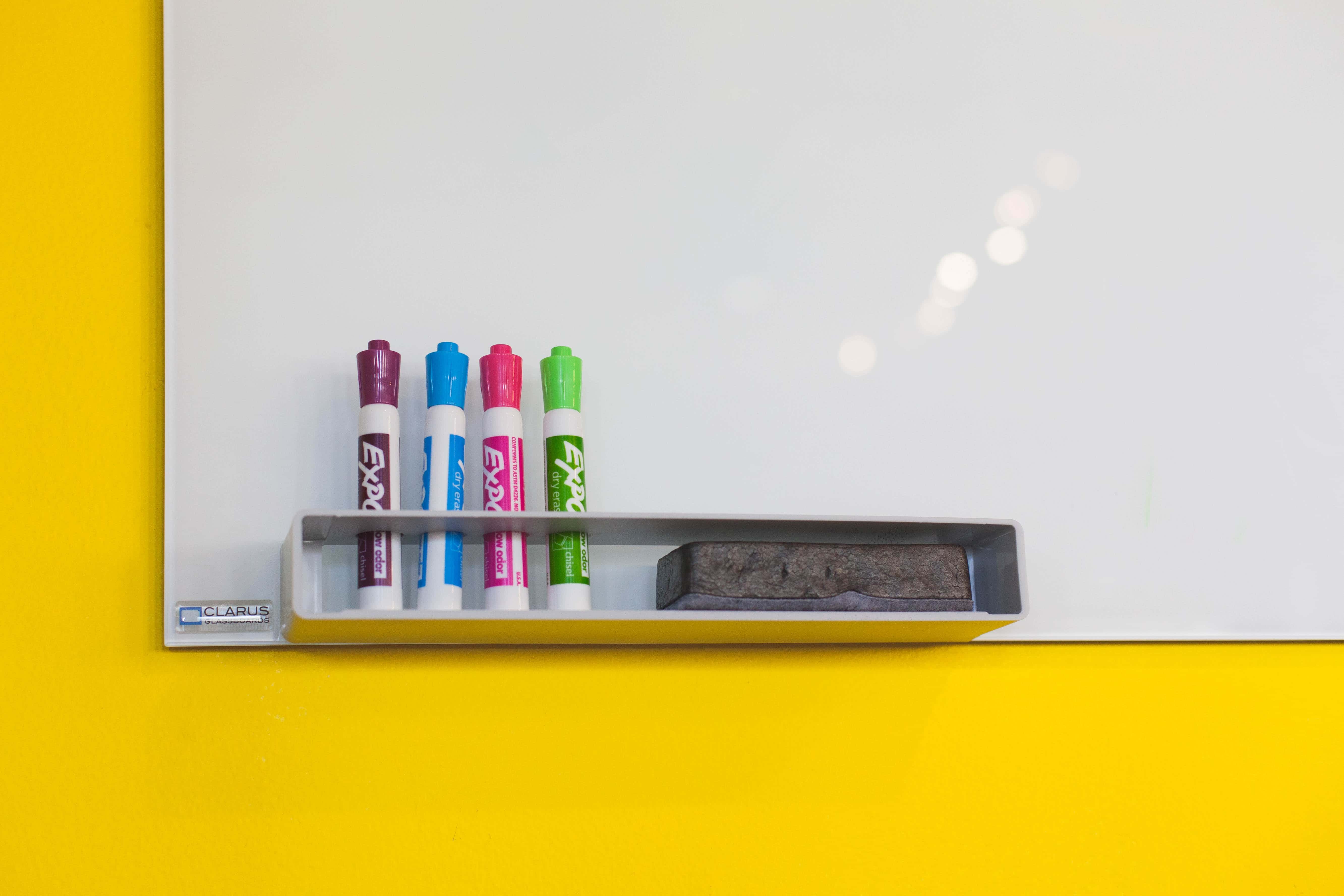
Source: Pexels
Let us now look at technical interview tips to show you what your technical interview should look like. Bear in mind that as a technical recruiter, it’s your responsibility to work together with your developers to optimize the entire recruitment process.
Technical interview tips
1. Cut the number of in-person interviews
Without a doubt, the best tip is to have fewer technical interviews. You might think that this would lead to hiring fewer people as a consequence, but conducting fewer interviews has a positive impact on the quality of your technical interview. You have more time on your hands which gives you the chance of personalizing the experience and making it more humane.
The number of people your HR and Dev team has to interview depends on how you screen technical skills. Improving your screening procedure has a tremendously positive effect on the number of in-person interviews you need to organize. The earlier you screen technical skills in the process, the better. In other words, an automated technical screening solution allows you to eliminate candidates who would fail the technical interview anyway. This means you don’t need to conduct postless interviews.
Here’s an excellent example from Lingonberry Talent Acquisition: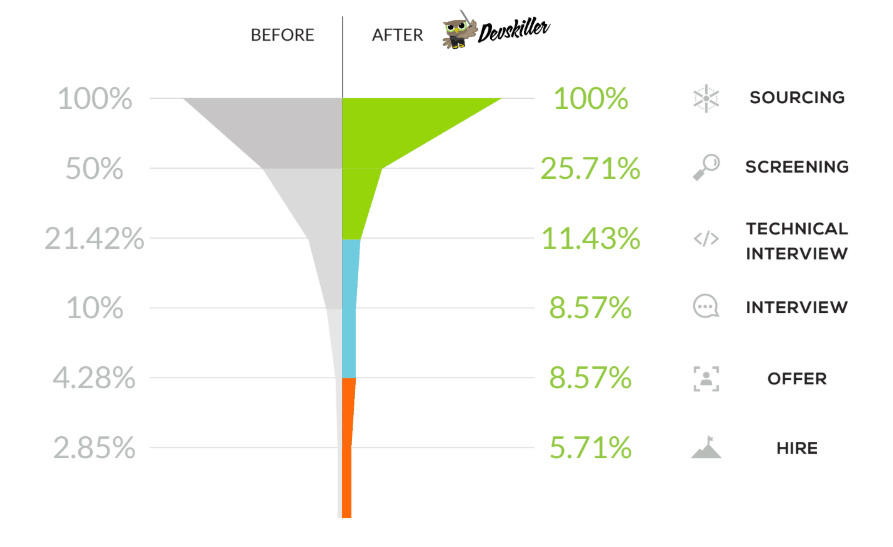
After implementing DevSkiller, Lingonberry was able to cut down the number of technical interviews they held by a staggering 53%. They managed to do that by being more accurate with their technical screening.
That’s an easy way of getting on good terms with developers who typically conduct the interview. You can involve them as late as you possible and let them focus on their projects.
2. Be quick
According to Jobvite, “50% of job seekers had at least one interview in the last year to explore options or get experience – with no intention of leaving their current jobs.” The number is even higher if you add those actively looking into making a job move.
Your developer candidates are probably talking to other companies and looking into other career opportunities. Because their skills are in high demand, they typically get more than one offer at a time. If you’re really interested in a candidate, schedule the technical interview to happen as soon as possible.
If you do need to cancel, make sure the rescheduled interview happens no matter what. Should you reschedule again, the candidate might lose interest in the position because it gives off the wrong impression of your company.
3. Imitate the work to be done
The technical interview gives your technical leads, dev team members, and your candidates the chance to work together and get to know each other.
Developers show up to your technical interview to have their skills assessed, meet the people they could potentially be working with, and get a feeling of the company. They don’t appreciate being asked vague questions which do very little (if anything) to assess their coding skills.
My personal favorite? “Tell me about HTML.”
4. Go online
Scheduling interviews is often an issue. This is especially true for candidates who are considering relocation so they can work for you. Scheduling a remote coding interview session can give you great insights into how a given developer likes to work without asking them to travel. Both in-person and remote coding interviews come with their own benefits. If you want to learn more about remote code pair interviews, I highly recommend our post: Online coding interview and how to CodePair remotely
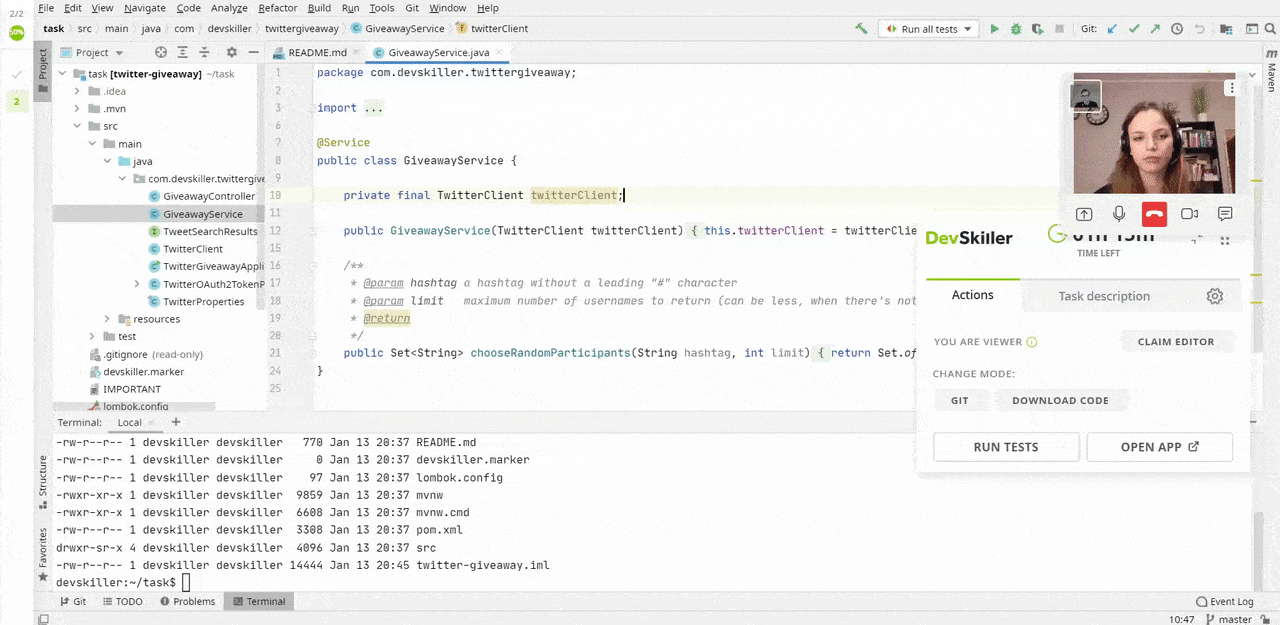 5. Hire on consensus
5. Hire on consensus
If the interview room is too busy, it might feel like an interrogation and not a conversation. That said, according to Joel Spolsky, throughout the entire recruitment process, your candidate has to be seen by at least six people. Two of these should be their immediate peers. Ideally, you need a consensus for each hire and if more than two people disagree, you should not hire the candidate.
Bringing too many people to the technical interview can be stressful to the candidate. To avoid this, you can record your sessions and show them to the rest of the team.
6. Work on your candidate experience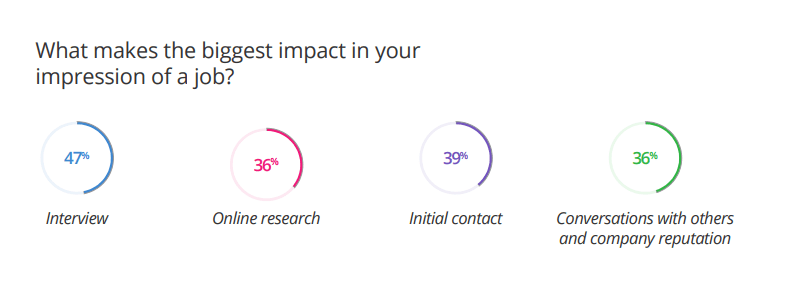
Source: Jobvite
According to Jobvite, 47% of candidates say the interview makes the biggest impact on their impression of the job.
What kind of impression do your interviewers give? Do they show up on time? Are they collectively grilling the candidate or having a conversation? Do they introduce themselves to the candidate?
7. Make sure all interviewers receive training
“Just because your interviewer is a brilliant software developer doesn’t mean he’s a brilliant interviewer. I’ve seen some of the most horrible interviews by great software developers. “, says Kevin Ferguson, President and CEO of Craftlogic. Understanding the variety of possible answers is necessary so questions and tasks should be prepared before the interview. You can choose to go off script to some extent depending on how the interview unfolds. That said, you should definitely have a script.
Conclusion: technical interview tips
A good technical interview is informative and relevant to what your company is doing. It provides insights to both the HR and dev departments. It is carried out to elicit certain actions and responses so you can assess problem-solving skills and see how your candidate would do in your team.
What are the best technical interview tips that you’ve ever received? Let me know in the comments section below!
Share post